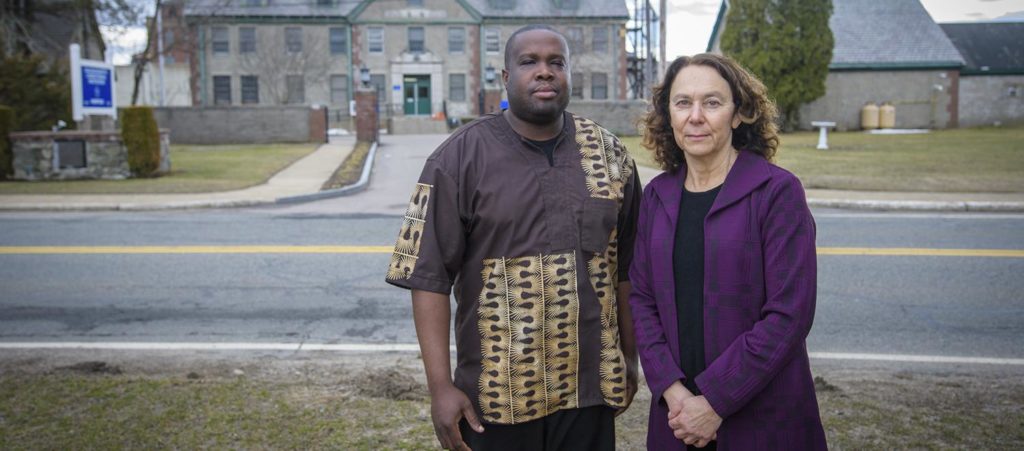The freedom of a classroom — behind bars

Every Wednesday this semester, Clark University Sociology Professor Shelly Tenenbaum needed to remember to leave cell phone, wallet, pen, hat and gloves behind before she went to work. She also could not wear a jacket with a hood. Her class could be postponed because of a lockdown, and a student’s absenteeism might be attributed to time spent in solitary confinement.
Tenenbaum, director of Clark’s Holocaust and genocide studies undergraduate program, spent part of her sabbatical year teaching a course on comparative genocide in a college program to students at the Massachusetts Correctional Institute – Norfolk, an all-male medium-security prison 50 minutes southeast of Worcester. She worked as a faculty member in Boston University’s Prison Education Program.
Along with teaching assistants Claude Kaitare ’05 (pictured above with Tenenbaum) and Boston University Ph.D. candidate Amanda Napior, Tenenbaum brought many of the lessons from her genocide classes at Clark into the Norfolk prison block.
“I love teaching at Clark,” Tenenbaum says, “but I was ready for a new teaching experience, new challenges. This sabbatical offered an opportunity to act on that interest.”
Tenenbaum relished the change of environment, and was impressed by the inmates’ engagement with the material. The experience may even help reshape the way she teaches future introductory genocide courses at Clark, she says. At the very least, it left her examining the language she uses when discussing genocides throughout history.
Tenenbaum walked into the classroom with the “excited anxiety” of teaching inmates topics like the Stanford Prison Experiment — an influential 1971 social experiment in which college students acting as jailers abused other students portraying prisoners. Would that discussion be problematic for her Norfolk students in ways that it would not be for Clark students?
Ultimately, the anxiety only energized the classroom give-and-take. “In the prison classroom, there was comfort with disagreement, but without an edge,” she says. The students were respectful but asked probing questions about the nature of genocide and drew parallels to American history and contemporary life.
Kaitare brought first-hand experience to the subject matter. A survivor of the Rwandan Genocide, he arrived at Clark in 2001 as a pre-med major, wanting to avoid reminders of what he’d fled. By sophomore year, his attitude had changed. Needing to fulfill electives, he signed up for Tenenbaum’s comparative genocide course and eventually switched his major to history, forgoing his pre-med scholarship money to do so.
For the first time, Kaitare was able to process the horror he had witnessed from an entirely new perspective — with an awareness of genocides that had occurred in other countries. “I thought Rwanda was unique,” he says. He describes the comparative aspect of Tenenbaum’s course as “therapeutic” because he could connect his personal experience to other places and time periods.
At MCI – Norfolk, Kaitare says, the older students were aware of Rwanda’s history. As for the younger students, “I had to show them on a map where Rwanda is.”
“Connections happened,” he says. “When we talked in groups I could figure out how they were understanding it.”
Tenenbaum had broader ambitions than simply teaching a new demographic of students. Like any good sociologist, she was researching as well, hoping to examine how the course changes when she presents material to students from different backgrounds. Does it make her more thoughtful in her language, for instance? Does she respond to the source material differently? What kinds of questions does she receive from one section of students versus the other?
“If I always teach at one place I’d never notice that,” she says.
Eventually, Tenenbaum would like Clark to look into starting a similar extension program, or at the very least bring more Clark students into her classes at MCI – Norfolk (or possibly MCI – Framingham, a women’s prison).
For Kaitare, who works with the school-outreach organization Facing History and Ourselves and studies in Salem State University’s graduate-level Holocaust and Genocide certificate program, his ultimate goal doesn’t require extensive field notes.
“Ignorance is the root cause of all big problems in our society,” he says. “I raise awareness in hopes of eradicating ignorance.”


